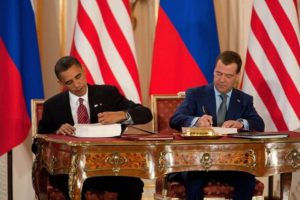By Taylor Felt, Policy Intern
 Today, we are past the days of ‘duck and cover;’ of frequent explosive nuclear testing; and of, to a certain extent, constant concern that a U.S. city will be decimated in the clearing of a mushroom cloud. The arms race throughout the Cold War led the United States and the former Soviet Union (and the rest of humanity) to the brink due to the lack of constraints on nuclear weapons. Today, there are treaties and agreements that prevent another era of unconstrained nuclear development, preventing daily contemplation of the existential threat to our day-to-day lives. Why, then, would we begin to dismantle the agreements that bring us greater stability?
Today, we are past the days of ‘duck and cover;’ of frequent explosive nuclear testing; and of, to a certain extent, constant concern that a U.S. city will be decimated in the clearing of a mushroom cloud. The arms race throughout the Cold War led the United States and the former Soviet Union (and the rest of humanity) to the brink due to the lack of constraints on nuclear weapons. Today, there are treaties and agreements that prevent another era of unconstrained nuclear development, preventing daily contemplation of the existential threat to our day-to-day lives. Why, then, would we begin to dismantle the agreements that bring us greater stability?
The New Strategic Arms Reduction Treaty (commonly referred to as New START), signed in 2010 by former U.S. President Barack Obama and former Russian President Dmitry Medvedev, marked a commitment “to reduce further the role and importance of nuclear weapons.” This treaty is far from groundbreaking in theory, as it is the successor to and expands on commitments enumerated in the START I Treaty, a similar treaty signed in 1991. New START is, however, groundbreaking in its commitments: both the Russian Federation and the United States agreed to limit their deployed warheads, as well as delivery systems, to levels not seen since the 1950s. Last year, both countries met the central limits under the treaty and continue to faithfully implement the agreement.
As we mark the eighth anniversary of the treaty entering into force, there are already discussions about whether New START will be extended before expiring in 2021. According to Reuters, President Trump called New START a “bad deal” that favors Russia. Trump’s statement suggests that he would be unwilling to allow for the very necessary five-year extension. This extension, however, is paramount to maintaining stability and predictability when it comes to Russia’s nuclear arsenal.
There seems to be a clear preference of the Trump administration to criticize, if not walk away from, nuclear-related agreements and treaties. President Trump has already withdrawn from the Joint Comprehensive Plan of Action (JCPOA) with Iran and has announced an impending withdrawal from the Intermediate-Range Nuclear Forces (INF) Treaty. By walking away from nuclear treaties, the Administration risks weakening the barriers to both horizontal (more countries acquiring nuclear weapons) and vertical proliferation (countries with nuclear weapons acquiring more. The collapse of nuclear treaties between the United States and Russia could pave the way for a new arms race between the two countries. Not only would that be destabilizing and detrimental to the security of the entire world, it’s a story we have all read before and hoped to never read again.
The importance of maintaining New START cannot be overstated. Not only does the treaty open channels of communication and allow for transparency on both sides, it is also an important step in significantly reducing the strategic deployed nuclear arsenals of the two states who, between them both, maintain 92% of the global nuclear stockpile. It is also important to note that the limits set forth in the treaty allow the United States and Russia to maintain reliable deterrents. There is no need to build more nuclear weapons.
President Trump’s apparent distaste for international agreements of any kind has made the world less stable. When it comes to international agreements that help control nuclear risk, global security should outweigh the President’s whims. By not extending New START, the two countries would revert back to Cold War thinking and massively increase the risk of an unimaginable nuclear miscalculation. Although the Cold War arms race did not result in nuclear annihilation, there is no guarantee that a 21st century arms race would produce the same results. New START is more important than ever given rising tensions between the United States and Russia. It ensures that present tensions will not translate into a catastrophic arms race and prevent humanity from going to the brink, once again.
